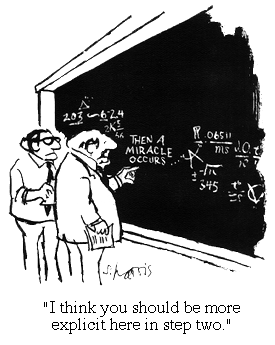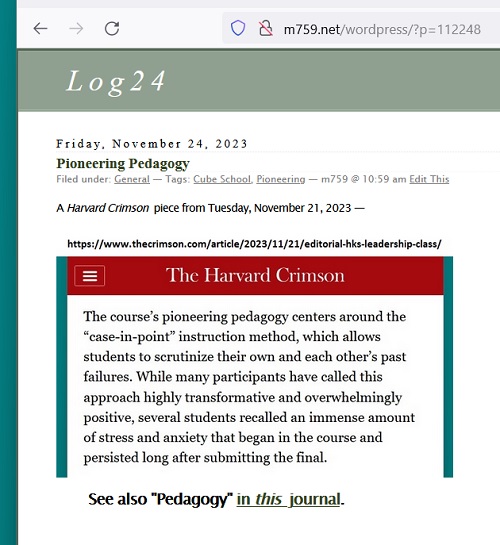Detail of a February 16 illustration from The Harvard Crimson .
Sunday, February 18, 2024
For Students of the Crimson Abyss:
Vocabulary Illustrated
Vocabulary Illustrated
Saturday, February 10, 2024
Gilded Cage Meets Crimson Abyss
Wednesday, January 10, 2024
The Crimson Abyss . . .
Continues . . .
"And as the characters in the meme twitch into the abyss
that is the sky, this meme will disappear into whatever
internet abyss swallowed MySpace."
—Staff writer Kamila Czachorowski, Harvard Crimson , March 29, 2017

Myspace.com (today) —
See also this journal on New Year's Eve 2005
and other remarks from that date . . .
Mytruth.com —

NOTE: Do not try to view the current version of mytruth.com.
It was blocked by my antivirus program due to a possible trojan.
Tuesday, April 25, 2023
For the Crimson Abyss
Sunday, May 5, 2019
The Crimson Abyss
Tuesday, April 11, 2017
Partitioning the Crimson Abyss
For the title, see Crimson + Abyss in this journal.
Wednesday, March 29, 2017
The Crimson Abyss
"And as the characters in the meme twitch into the abyss
that is the sky, this meme will disappear into whatever
internet abyss swallowed MySpace."
—Staff writer Kamila Czachorowski, Harvard Crimson , March 29
1984 —
2010 —
Logo design for Stack Exchange Math by Jin Yang
Recent posts now tagged Crimson Abyss suggest
the above logo be viewed in light of a certain page 29 —
"… as if into a crimson abyss …." —
Update of 9 PM ET March 29, 2017:
Prospero's Children was first published by HarperCollins,
London, in 1999. A statement by the publisher provides
an instance of the famous "much-needed gap." —
"This is English fantasy at its finest. Prospero’s Children
steps into the gap that exists between The Lion, the Witch
and the Wardrobe and Clive Barker’s Weaveworld , and
is destined to become a modern classic."
Related imagery —

See also "Hexagram 64 in Context" (Log24, March 16, 2017).
Thursday, January 25, 2024
The Much-Needed Gap
|
Prospero's Children was first published by HarperCollins,
"This is English fantasy at its finest. Prospero’s Children |
"… as if into a crimson abyss …." —

Related material in this journal: Weaveworld.
Sunday, February 26, 2023
Thursday, November 3, 2022
“A Lot”
"In a typical Booth cartoon, a lot happens at once."
Cartoonish news from yesterday . . .

New Yorker cartoon caption, not by Booth —
"What part of Noh don't you understand?"
Scholium —
The H — and …

Thursday, May 23, 2019
Fire on the Water
Related literary remarks from The Crimson Abyss
(a Log24 post of March 29, 2017) —
|
Prospero's Children was first published by HarperCollins,
"This is English fantasy at its finest. Prospero’s Children |
Related imagery from The Crimson Abyss —

See as well posts of June 6, 2004, and May 22, 2004.
Monday, May 6, 2019
Possibilities
Related material — The last three posts —
The Crimson Abyss,
Transgressive Politics at Harvard, and
"Thousand" Rhetoric
— as well as Saturday's The Chinese Jars of Shing-Tung Yau.
Sunday, December 17, 2017
Wheelwright and the Wheel
From the 1968 "new and revised edition" —

See also the previous post.
For the phrase "burning fountain," see Shelley's "Adonais,"
as well as Logos (a post of Dec. 4) and The Crimson Abyss.
Monday, December 4, 2017
Saturday, May 6, 2017
Frame
Suggested by remarks in last night's link to posts tagged Swimmer —
"A professor is all-powerful, Gareth liked to tell his daughter,
he puts ‘a veritable frame around life,’ and ‘organizes the
unorganizable. Nimbly partitions it into modern and postmodern,
renaissance, baroque, primitivism, imperialism and so on. . . .'"
— From a review by Liesl Schillinger in the Aug. 13, 2006,
New York Times of a new novel by Marisha Pessl:
Special Topics in Calamity Physics.
"A veritable frame" —
"Nimbly partitions" —
See also partitioning in posts tagged Crimson Abyss.
Saturday, April 15, 2017
Pip
The title is from a poem in The New Yorker last December —
. . . pip trapped inside, god’s
knucklebone . . . .
The conclusion of yesterday's Google Image Search for Göpel Inscape —
See also "Pray to Apollo" in this journal.
Friday, April 7, 2017
Personal Identity
From "The Most Notorious Section Phrases," by Sophie G. Garrett
in The Harvard Crimson on April 5, 2017 —
This passage reminds me of (insert impressive philosophy
that was not in the reading).
This student is just being a show off. We get that they are smart
and well read. Congrats, but please don’t make the rest of the us
look bad in comparison. It should be enough to do the assigned
reading without making connections to Hume’s theory of the self.
Hume on personal identity (the "self") —
|
For my part, when I enter most intimately into what I call myself, I always stumble on some particular perception or other, of heat or cold, light or shade, love or hatred, pain or pleasure. I never can catch myself at any time without a perception, and never can observe any thing but the perception. When my perceptions are removed for any time, as by sound sleep, so long am I insensible of myself, and may truly be said not to exist. And were all my perceptions removed by death, and could I neither think, nor feel, nor see, nor love, nor hate, after the dissolution of my body, I should be entirely annihilated, nor do I conceive what is further requisite to make me a perfect nonentity. I may venture to affirm of the rest of mankind, that they are nothing but a bundle or collection of different perceptions, which succeed each other with an inconceivable rapidity, and are in a perpetual flux and movement. Our eyes cannot turn in their sockets without varying our perceptions. Our thought is still more variable than our sight; and all our other senses and faculties contribute to this change: nor is there any single power of the soul, which remains unalterably the same, perhaps for one moment. The mind is a kind of theatre, where several perceptions successively make their appearance; pass, repass, glide away, and mingle in an infinite variety of postures and situations. There is properly no simplicity in it at one time, nor identity in different, whatever natural propension we may have to imagine that simplicity and identity. The comparison of the theatre must not mislead us. They are the successive perceptions only, that constitute the mind; nor have we the most distant notion of the place where these scenes are represented, or of the materials of which it is composed. |
Related material —
Imago Dei in this journal.
Backstory —
The previous post
and The Crimson Abyss.
Thursday, March 30, 2017
The Internet Abyss
Suggested by the previous post, The Crimson Abyss —
“Wer mit Ungeheuern kämpft, mag zusehn, dass er nicht dabei
zum Ungeheuer wird. Und wenn du lange in einen Abgrund blickst,
blickt der Abgrund auch in dich hinein.”
“He who fights with monsters should look to it that he himself
does not become a monster. And if you gaze long into an abyss,
the abyss also gazes into you.”
— Nietzsche, Beyond Good and Evil , Aphorism 146
From the Internet Abyss on Red October Day, October 25, 2010 —
An image reproduced in this journal on that same day —
























